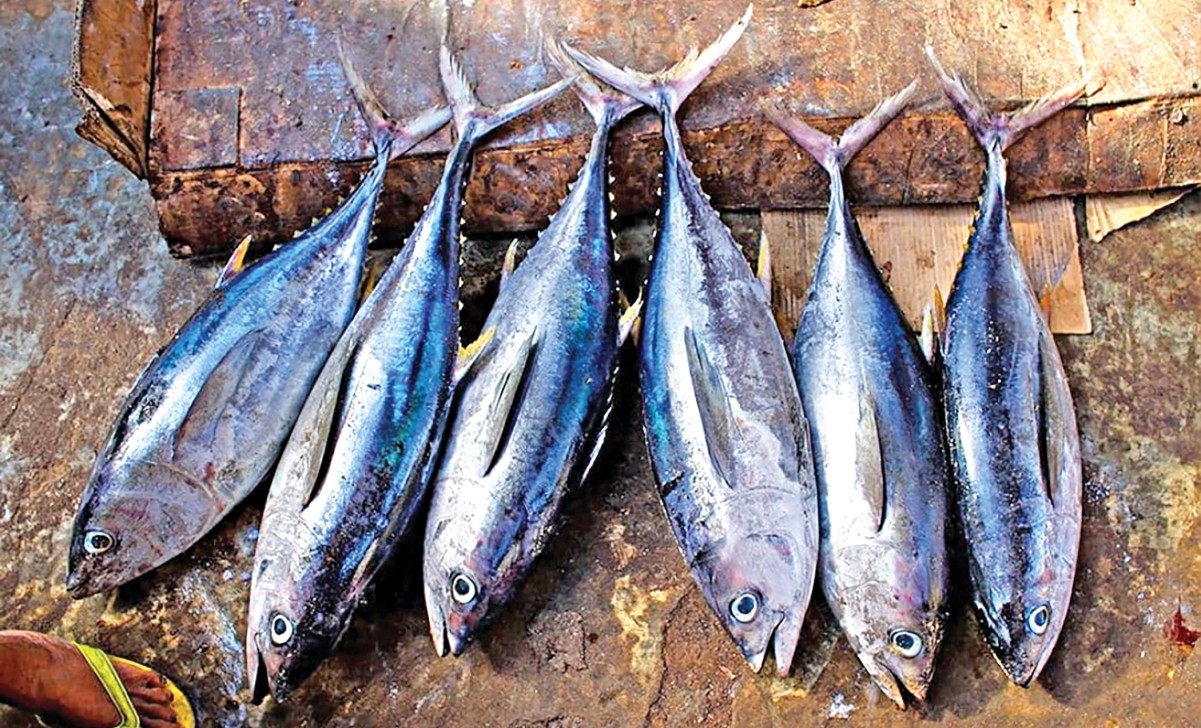Tuna fishing faces uncertainty

The prospect of tuna fishing deep in the Bay of Bengal is hanging in the balance owing to a lack of interest of licensee firms in bringing trawlers to catch the commercially important fish, said insiders.
In April 2016, the government started giving licences to firms to bring vessels to catch tuna and pelagic fishes beyond the 200-metre depth of the Bay and in international waters.
Until April last year, it awarded licences to 17 firms for longline and purse seine fishing.
None of the firms, some of which are connected to people of the ruling Awami League, has brought trawlers despite the passing of one and a half years since the last licence was issued in April 2018, according to the Ministry of Fisheries and Livestock.
Industry operators say the requirement for investing a large amount of capital and a lack of data about tuna stocks, available species and idea about tuna fishing grounds have kept licensee firms from bringing the vessels.
“All are still in dilemma regarding bringing the vessels,” said Md Towfiqul Arif, joint secretary for blue economy of the fisheries ministry.
He said the ministry sat with the licensees recently and would sit again this month to review the progress.
The government awarded the licences in a bid to explore offshore resources after the country attained the right to fish in 118,813 square kilometres of the Bay of Bengal following a verdict from an international tribunal in 2014.
Bangladesh also became a member of the Indian Ocean Tuna Commission to explore tuna stocks outside the boundary of its 200 nautical miles. The commission is an intergovernmental organisation mandated to manage tuna and tuna-like species in the Indian Ocean and adjacent seas.
And as per conditions of the licences, firms have to submit detailed work plans and specifications of vessels to the fisheries ministry within six months of getting licences.
Moreover, the trawlers are required to be imported or constructed within two years of the licences being provided, according to the ministry.
The ministry in its licencing conditions said no fishing trawler past 10 years of age could be imported.
Joint Secretary Arif said all the licensees submitted specifications of vessels they wanted to buy. The ministry approved the specifications.
Yet, progress remains sluggish, prompting the ministry to extend deadlines following applications from firms.
“It appears that some have got licences without any clear understanding about the prospect,” said an official of the ministry.
Industry insiders say tuna fishing is a new concept in the country and local firms do not have any idea about business prospects in longline and purse seine fishing.
And despite the limitation, firms have applied and got the licences expecting that this would be a profitable sector and they would get foreign partners in their venture, said stakeholders.
“No one is interested to come here only for tuna fishing as it requires high investment,” said AK Sarkar, executive director of Karnaphuli, which received licence for longline fishing.
He said Karnaphuli approached a Chinese firm offering it to become a partner in the venture but the firm was not interested in tuna fishing only as it is seasonally available.
“They informed us that they would come, provided they are allowed to catch other fishes in off-season, not only tuna fish. Otherwise, they are not interested.”
Sarkar said his office has already informed the ministry about the development. “We are looking for another partner,” he added.
Sarkar says large investments are required and joint ventures have to be formed to do the job.
“It is not possible for us to make such a high investment. If the licence is cancelled, let it be. We are not interested.”
Stakeholders say roughly Tk 100 crore in investment is required to bring a trawler, and none dares to make such an investment without a clear idea about returns.
Insiders say foreign investors want to know about fish stocks before joining hands in the venture. Banks are not interested to finance without knowing about stocks.
Mahbubur Rahman, chief executive of Al Rafi Travel Trade, which has got a licence for purse seine fishing, said they were not clear about the prospect.
“We hoped that the government would help us,” he said, adding that none was daring to invest a large amount of money in the sector without knowing about the prospect.
He says government support in the form of low-cost bank loans or bank guarantees is required to buy trawlers for deep-sea fishing.
Rahman, however, said they formed an association on deep-sea fishing and bought an old trawler. Repairs are on, he said.
Arif says firms that got the licences are trying to form joint ventures or get loans from the Bangladesh Bank.
“We may also pursue the matter so that they get loans,” he said.
Asked whether the ministry would revoke the licences, he said the firms have been given until December. “We will review the actual situation before taking any decision.”
A study in the journal Fisheries Research estimated that about 6 million tonnes of tuna are now caught annually, reported the Guardian recently.
Researchers found that 67 percent of the world’s tuna catches are made in the Pacific Ocean by Japanese and American fleets, 12 percent in the Indian Ocean, and 12 percent in the Atlantic.
